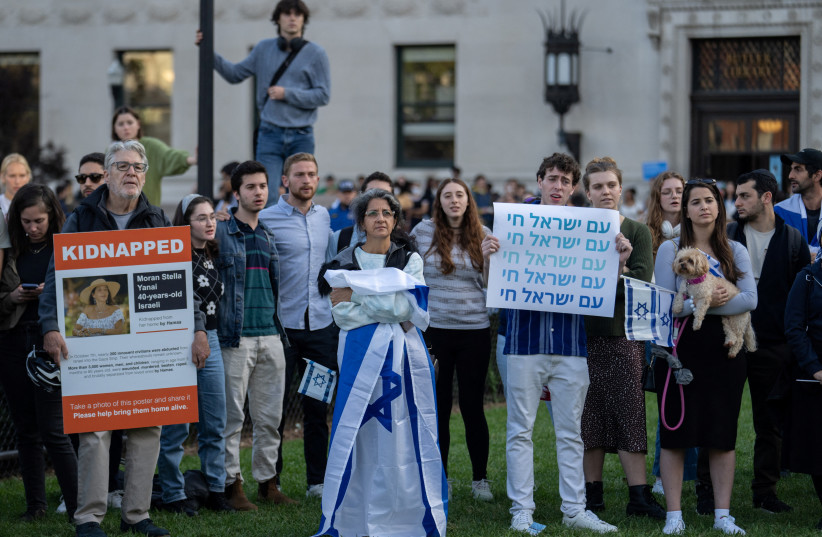After months of Columbia University anti-Israel groups asserting they had been targeted in a chemical weapons attack by an Israeli student at a protest, it was revealed in a complaint filed Tuesday against the university challenging his suspension that he had only used a novelty fart spray.
The student had been suspended after attending a January 17 Pro-Palestinian protest in which “he sprayed into the air a novelty, non-toxic ‘fart’ spray named ‘Liquid Ass’ and ‘Wet Farts.’” The complaint filed to the United States Southern District of New York Court stated that he had purchased the gag sprays on Amazon for $26.11.
Students for Justice in Palestine Columbia (SJP) and Jewish Voice for Peace Columbia (JVP), both of which had been suspended in November for holding unsanctioned events, claimed that activists had been hospitalized after being attacked with an “illegal chemical-based weapon.”
SJP had claimed that the student, a former IDF soldier, had used Skunk, a foul-smelling anti-riot agent. Pro-Palestinian activists have frequently referred to the incident and the “chemical warfare” in online advertisements and activist materials.
Columbia is Ground-Zero for Jew-hatred
The filing noted that there was no evidence to support the claims that the students were harmed by the spray, and that those who filed complaints against the plaintiff had declined counseling and medical evaluations.
They had also opened fundraising pages for donations to alleviate their alleged suffering. The university allegedly accepted these claims to characterize the plaintiff as dangerous.
“Plaintiff brought this spray along with him to the rally, to express his speech and thoughts regarding the pro-Hamas pro-Palestine, anti-Israel sentiment,” said the filing. “Students at the rally shouted genocidal slogans such as ‘Intifada,’ ‘Jewish Genocide,’ ‘Glory to the Martyrs,’ ‘Expulsion of IOF [IDF] students,’ and ‘From the river to the sea, Palestine will be Free.’
“While at the rally, and during the chants of genocidal slogans, Plaintiff sprayed the odorous spray in the air – not directly at any individual. Plaintiff’s actions were a harmless expression of speech to demonstrate discontent with the pro-Hamas pro-Palestine message through the use of a gag gift, and nothing further.”

The filing said the university took no action against the students calling for violence at an “unauthorized event” in violation of university policies, calling it an expression of speech, but soon placed the Jewish student on interim suspension on January 21. The university said the incident may have been “serious crimes, possibly hate crimes.”
“Columbia engaged in disparate treatment of Plaintiff by treating him, as a Jewish student, differently from similarly situated students, and harshly enforcing alleged policy violations against Plaintiff, while not doing so for the students that engaged in pro-Palestine rallies in violation of the University’s Policies,” said the complaint.
The Israeli student received death threats on social media, and had fake wanted posters created with his name and picture claiming he was “armed and dangerous.” The complaint alleged that the university ignored the student's concern for his safety, and took no action to his doxing, which was against university policies.
The university allowed the discrimination of the student for his national origin, the complaint accused, in line with a long history of permitting antisemitic behavior on campus.
“Columbia University has long been ground zero for Jew-hatred in American universities,” said the student’s lawyer, Jeffery Lichtman. “Whether it is hiring virulently antisemitic professors or importing violent antisemitic students from the Middle East, Columbia has long allowed Jew-hatred and abuse of Jews to exist on its campus and in its classrooms for decades.
“With this lawsuit, Columbia will finally be taken to task for ignoring the cries of help from Jewish students who have been victimized at this university for far too long.”
Ultimately, the student was suspended for 1.5 years in a review process, that the complaint alleged was not properly or fairly conducted, failing to share all evidence with him before the disciplinary hearing.
The student faced damage to his reputation, academic career, and economic prospects because of the misrepresentation of his actions.
“Plaintiff was presumed guilty from the start, due to his affiliation with Israel,” said the complaint.
The student requested a trial by jury on these issues of discrimination.
